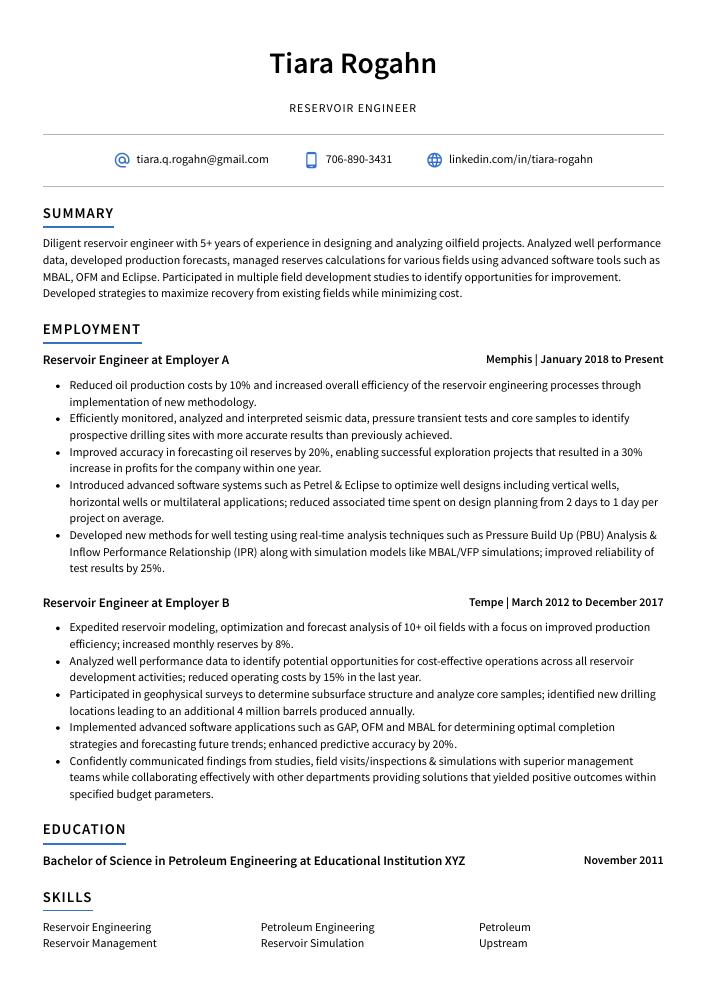Reservoir Engineer Resume Guide
Reservoir Engineers are responsible for designing, developing and maintaining the reservoirs that store oil and gas. They analyze data from wells to determine production levels, develop plans for increasing reservoir performance, design well completion strategies, evaluate new drilling technologies and monitor compliance with safety regulations.
Your reservoir engineering knowledge is unmatched, and you’d be an invaluable asset to any oil and gas company. To show employers your expertise in this field, you must craft a resume that stands out from the crowd.
This guide will walk you through the entire process of creating a top-notch resume. We first show you a complete example and then break down what each resume section should look like.
Table of Contents
The guide is divided into sections for your convenience. You can read it from beginning to end or use the table of contents below to jump to a specific part.
Reservoir Engineer Resume Sample
Tiara Rogahn
Reservoir Engineer
tiara.q.rogahn@gmail.com
706-890-3431
linkedin.com/in/tiara-rogahn
Summary
Diligent reservoir engineer with 5+ years of experience in designing and analyzing oilfield projects. Analyzed well performance data, developed production forecasts, managed reserves calculations for various fields using advanced software tools such as MBAL, OFM and Eclipse. Participated in multiple field development studies to identify opportunities for improvement. Developed strategies to maximize recovery from existing fields while minimizing cost.
Experience
Reservoir Engineer, Employer A
Memphis, Jan 2018 – Present
- Reduced oil production costs by 10% and increased overall efficiency of the reservoir engineering processes through implementation of new methodology.
- Efficiently monitored, analyzed and interpreted seismic data, pressure transient tests and core samples to identify prospective drilling sites with more accurate results than previously achieved.
- Improved accuracy in forecasting oil reserves by 20%, enabling successful exploration projects that resulted in a 30% increase in profits for the company within one year.
- Introduced advanced software systems such as Petrel & Eclipse to optimize well designs including vertical wells, horizontal wells or multilateral applications; reduced associated time spent on design planning from 2 days to 1 day per project on average.
- Developed new methods for well testing using real-time analysis techniques such as Pressure Build Up (PBU) Analysis & Inflow Performance Relationship (IPR) along with simulation models like MBAL/VFP simulations; improved reliability of test results by 25%.
Reservoir Engineer, Employer B
Tempe, Mar 2012 – Dec 2017
- Expedited reservoir modeling, optimization and forecast analysis of 10+ oil fields with a focus on improved production efficiency; increased monthly reserves by 8%.
- Analyzed well performance data to identify potential opportunities for cost-effective operations across all reservoir development activities; reduced operating costs by 15% in the last year.
- Participated in geophysical surveys to determine subsurface structure and analyze core samples; identified new drilling locations leading to an additional 4 million barrels produced annually.
- Implemented advanced software applications such as GAP, OFM and MBAL for determining optimal completion strategies and forecasting future trends; enhanced predictive accuracy by 20%.
- Confidently communicated findings from studies, field visits/inspections & simulations with superior management teams while collaborating effectively with other departments providing solutions that yielded positive outcomes within specified budget parameters.
Skills
- Reservoir Engineering
- Petroleum Engineering
- Petroleum
- Reservoir Management
- Reservoir Simulation
- Upstream
- Gas
- Oil and Gas
- Field Development
Education
Bachelor of Science in Petroleum Engineering
Educational Institution XYZ
Nov 2011
Certifications
Certified Petroleum Reservoir Engineer
Society of Petroleum Engineers
May 2017
1. Summary / Objective
The summary or objective at the top of your reservoir engineer resume should give a brief overview of who you are and why you excel in this field. This is where you can showcase your best qualities; for example, mention the types of reservoirs and production systems that you have experience with, any certifications or awards related to reservoir engineering that you possess, as well as how many years’ worth of experience in this field that you have.
Below are some resume summary examples:
Determined reservoir engineer with 7+ years of experience in the oil and gas industry. Experienced in developing innovative strategies for well completion, production optimization, and reservoir management. At XYZ Corporation, led a team to increase production efficiency by 20% over 12 months using advanced analytical models. Adept at understanding complex geological structures and applying pressure-transient analysis for optimal development plans.
Accomplished reservoir engineer with 8+ years of experience in subsurface analysis, reservoir simulation, and production optimization. Skilled at developing efficient oilfield development plans through the use of advanced mathematical models. At XYZ Corporation, improved well designs by 20% while saving $400K on drilling costs over a period of 3 years. Successfully managed 10 projects simultaneously within budget & time constraints.
Dependable reservoir engineer with 6+ years of experience in the oil and gas industry. Highly adept at developing enhanced recovery plans, performing reservoir simulations, preparing project proposals, and analyzing data to make informed decisions. Expertise in utilizing modern engineering tools such as Eclipse 100/300 & VIP Studio. Looking to join ABC Energy Solutions to utilize my skillset for greater growth opportunities.
Committed reservoir engineer with 5+ years of experience in the oil and gas industry. Expertise in production optimization, reservoir simulation, well testing, and data analysis. Proven track record for increasing production by 20% through advanced software modeling techniques at ABC Energy Solutions. Seeking to apply extensive knowledge of petroleum engineering principles to maximize efficiency at XYZ Corporation.
Detail-oriented reservoir engineer with 5+ years of experience in the oil and gas industry. Demonstrated success leveraging advanced technologies to design efficient well plans, as well as monitor performance and optimize operations. Seeking to join ABC Oil & Gas’ team of reservoir engineers to maximize production from their existing wells while exploring new opportunities for growth.
Driven reservoir engineer with 8+ years of experience developing, optimizing and managing oil & gas reservoirs. Proven expertise in using advanced technologies to assess petrophysical properties and accurately evaluate reservoir performance. Seeking a position at ABC Corp where I can apply my skills to increase production efficiency while mitigating environmental impacts.
Seasoned reservoir engineer with 10+ years of experience in the oil and gas industry. Expertise in reservoir evaluation, production optimization, pressure transient analysis, well test interpretation and material balance calculations. Proven track record of success including increasing production by 25% at XYZ Oilfield while reducing operating costs by 15%.
Skilled reservoir engineer with 5+ years of experience in oil and gas exploration, production and development. Proven track record of developing effective strategies for reservoir management that have maximized yields while minimizing costs. Looking to join ABC Energy Group where I can utilize my expertise to maximize the value of their assets.
2. Experience / Employment
In the experience/employment/work history section, you should list your jobs in reverse chronological order, with the most recent one first.
Stick to bullet points primarily when writing this section; doing so allows for easy digestion of information by the reader. You want to include detail and quantitative results whenever possible.
For example, instead of saying “Analyzed reservoir data,” you could say, “Performed detailed analysis on seismic data from a variety of reservoirs which resulted in an increase in production efficiency by 20%.”
To write effective bullet points, begin with a strong verb or adverb. Industry specific verbs to use are:
- Designed
- Constructed
- Monitored
- Inspected
- Analyzed
- Operated
- Calibrated
- Troubleshot
- Optimized
- Implemented
- Commissioned
- Upgraded
- Documented
- Evaluated
Other general verbs you can use are:
- Achieved
- Advised
- Assessed
- Compiled
- Coordinated
- Demonstrated
- Developed
- Expedited
- Facilitated
- Formulated
- Improved
- Introduced
- Mentored
- Participated
- Prepared
- Presented
- Reduced
- Reorganized
- Represented
- Revised
- Spearheaded
- Streamlined
- Structured
- Utilized
Below are some example bullet points:
- Formulated comprehensive oil and gas reservoir models for 5+ new reservoirs, resulting in increased production by 15% and optimized recovery efficiency.
- Spearheaded the development of a comprehensive well performance monitoring system that improved real-time data accuracy by 35%.
- Prepared monthly evaluations on all existing wells to identify any potential issues or optimizations; identified over $50,000 worth of cost savings through more efficient operations within 6 months.
- Thoroughly analyzed geological data from multiple sources to determine optimal drilling locations; successfully drilled 4 new exploration wells with an average success rate of 85%.
- Constructed detailed engineering drawings for surface facilities such as pipelines and tank farms, ensuring full compliance with safety regulations at all times; completed projects 10 days ahead of schedule on average per quarter.
- Advised on the design and implementation of reservoir simulation models, resulting in an increase of oil production by 45%.
- Represented company interests when negotiating energy-related contracts with vendors; saved over $1M in operating costs within a year.
- Coordinated multi-disciplinary teams to assess potential reserves and develop well strategies for optimal performance; facilitated the appraisal of 5 new fields with total recoverable hydrocarbon estimated at 7 million barrels.
- Compiled detailed reports on fluid flow characteristics, porosity & permeability distributions, pressure data analysis and other metrics related to reservoir modeling; identified 3 major gas reservoirs that increased production output by 30%.
- Effectively communicated complex technical information about subsurface geology and engineering operations to nontechnical personnel during team briefings or project presentations as needed.
- Evaluated data from over 300 reservoirs to identify and modify production strategies that increased total oil & gas output by 10%.
- Inspected the condition of wells, pumps and pipelines on a regular basis; identified potential risks and decreased preventable equipment failures by 15%.
- Troubleshot issues related to reservoir performance and proposed solutions that cost-effectively improved operational efficiencies by 20%.
- Accurately determined reserves in multiple fields using diverse techniques including volumetric analysis, material balance calculations, rate transient tests & decline curve methods.
- Reorganized data gathering processes resulting in reduced surveying times of up to 40% while maintaining accuracy standards set forth by management team members.
- Utilized advanced reservoir simulation software to accurately predict future oil and gas production rates, resulting in an increase of 20% in reserve estimation accuracy.
- Achieved cost savings by optimizing drilling locations through the application of geological data analysis techniques; saved $500,000 over two years while maintaining high standards for safety and environmental protection.
- Structured new field development plans that incorporated best practices from various disciplines such as geology, petrophysics and engineering; reduced project costs by 10%.
- Substantially improved monitoring processes for existing wells using real-time information gathering technologies which increased efficiency by 30%.
- Developed a comprehensive understanding of well stimulation methods (frac design/treatment) which enabled more efficient recovery operations with minimal downtime hours on average per month.
- Reliably provided technical solutions to optimize oil and gas field operations, resulting in a 6% increase in production efficiency over 3 years.
- Facilitated remotely operated projects involving the installation of pumps, valves and other related equipment; oversaw completion of 11+ successful commissioning projects for offshore fields across the Gulf coast region.
- Commissioned new well designs using advanced software tools such as Eclipse 300 / 400; created accurate simulation models that projected an average 10% higher recovery rate compared to standard practices.
- Demonstrated expertise in reservoir characterization techniques by conducting detailed petrophysical analysis on core samples from multiple wells; identified 2 potential development opportunities leading to increased reserves by $1 million+.
- Assessed appropriate pressure maintenance plans with stakeholders while staying compliant with regulatory guidelines, significantly reducing cost overruns by 20%.
- Documented and analyzed data on 7+ reservoirs, including permeability and porosity tests to accurately determine safe production levels; improved oil recovery rate by 14%.
- Presented weekly reports of reservoir performance to C-level executives, providing comprehensive insight into productivity trends across all fields and outlining suggested improvements for optimization.
- Upgraded well computer systems with advanced software that enabled real-time monitoring of field operations from a single platform; increased accuracy in predicting pressure drops by 23%.
- Designed development plans for new wells aiming at maximizing the ultimate recovery of hydrocarbons while minimizing operational costs; achieved cost savings up to $450K over 3 years period.
- Diligently monitored daily changes in reservoir parameters such as temperature and pressure using specialized tools, ensuring compliance with safety regulations at all times throughout drilling process.
- Operated SCAL, BHP and PVT software to monitor underground oil & gas reservoir pressure and production rates of up to 10 wells; identified potential risks in the field operations.
- Streamlined data processing by 15%, successfully analyzing well-logs, seismic surveys and core samples using advanced software tools such as Petrel E&P Software Platform.
- Successfully estimated recoverable hydrocarbon reserves for two major projects totaling $25M; reduced exploration risk through precise evaluation of geological models & resources utilization plans.
- Calibrated numerical simulation tools like Eclipse 100/300 suite with actual field measurements in order to accurately predict future development scenarios at various sites while reducing costs by 20%.
- Revised existing reserve estimates based on new drilling results or geological interpretations from recent studies resulting in improved forecasting accuracy over a 3-year period (+15%).
3. Skills
Even though two organizations are hiring for the same role, the skillset they want an ideal candidate to possess could differ significantly. For instance, one may be on the lookout for an individual with experience in reservoir simulation software and the other with expertise in seismic interpretation.
Therefore, you want to tailor the skills section of your resume for each job that you are applying for; this will ensure that it is picked up by applicant tracking systems which scan resumes for certain keywords before passing them on to a human.
You should also elaborate on some of these skills further down in your resume – such as within the summary or experience sections – so as to demonstrate how they have been applied successfully during past work experiences.
Below is a list of common skills & terms:
- AutoCAD
- Characterization
- Chemical Engineering
- Completion
- Completions
- Data Analysis
- Drilling
- Drilling Engineering
- Eclipse
- Energy
- Energy Industry
- Engineering
- Field Development
- Fluids
- Formation Evaluation
- Gas
- Geology
- Hydraulic Fracturing
- Logging
- MATLAB
- Modeling
- Natural Gas
- Offshore Drilling
- Oil
- Oil and Gas
- Oil and Gas Industry
- Oilfield
- Onshore
- Petrel
- Petroleum
- Petroleum Economics
- Petroleum Engineering
- Petroleum Geology
- Petrophysics
- Product Optimization
- Production Engineering
- Project Planning
- Reserves
- Reservoir Engineering
- Reservoir Management
- Reservoir Simulation
- Simulations
- Spotfire
- Stimulation
- Teamwork
- Upstream
- Well Testing
4. Education
Mentioning your education on a resume is typically dependent on how far along you are in your career. If you have just graduated and do not have any work experience, include an education section below your objective statement. However, if you already have significant professional experience to list, omitting the education section entirely may be acceptable.
If including an education section, try to mention courses related to reservoir engineering that could demonstrate your knowledge of the job requirements for which you are applying.
Bachelor of Science in Petroleum Engineering
Educational Institution XYZ
Nov 2011
5. Certifications
Certifications demonstrate to potential employers that you have the skills necessary for a given job. They are also an indication of your commitment and dedication to professional development, as they require time and effort to obtain.
Including certifications on your resume can help demonstrate that you possess the knowledge required for the position and give hiring managers confidence in your abilities. Be sure to include any relevant certifications when applying for jobs so that recruiters can see how qualified you are!
Certified Petroleum Reservoir Engineer
Society of Petroleum Engineers
May 2017
6. Contact Info
Your name should be the first thing a reader sees when viewing your resume, so ensure its positioning is prominent. Your phone number should be written in the most commonly used format in your country/city/state, and your email address should be professional.
You can also choose to include a link to your LinkedIn profile, personal website, or other online platforms relevant to your industry.
Finally, name your resume file appropriately to help hiring managers; for Tiara Rogahn, this would be Tiara-Rogahn-resume.pdf or Tiara-Rogahn-resume.docx.
7. Cover Letter
Providing a cover letter with your job application can be a great way to make yourself stand out from the crowd. It is essentially an opportunity for you to expand on what’s listed in your resume and provide more insight into who you are as a professional.
Cover letters usually consist of 2-4 paragraphs that address why you’re the perfect fit for the role, how your skills and experience match up with those required by the employer, as well as any special qualifications or personal attributes that may set you apart from other applicants.
Below is an example cover letter:
Dear Emely,
I am writing to apply for the position of Reservoir Engineer at XYZ Company. As a reservoir engineer with 5+ years of experience in the oil and gas industry, I have gained a deep understanding of reservoir characterization, fluid flow in porous media, and production operations. I am confident that I can be an asset to your team and contribute to the success of your organization.
In my current role as a senior reservoir engineer at ABC Company, I am responsible for leading a team of engineers in conducting field studies, developing reserve estimates, and optimizing production operations. I have also been involved in several new projects focused on enhanced oil recovery methods such as CO2 injection. My technical skills combined with my leadership abilities make me an ideal candidate for this position.
I believe that my skills and experience would benefit XYZ Company greatly. I look forward to discussing how I can contribute to your organization further during an interview. Thank you for your time and consideration.
Sincerely,
Tiara
Reservoir Engineer Resume Templates
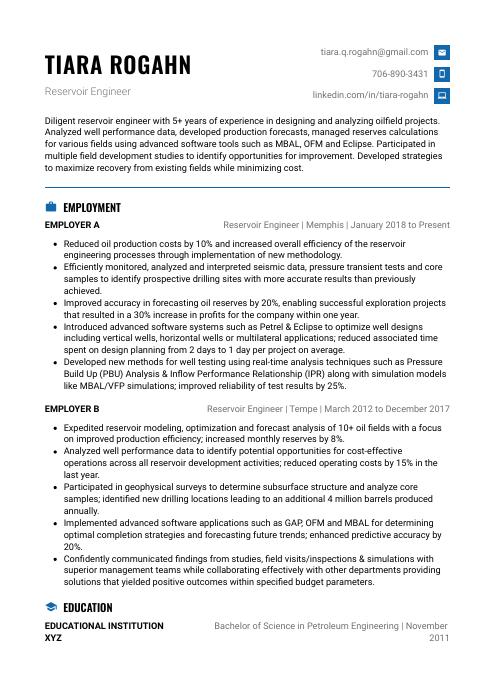 Echidna
Echidna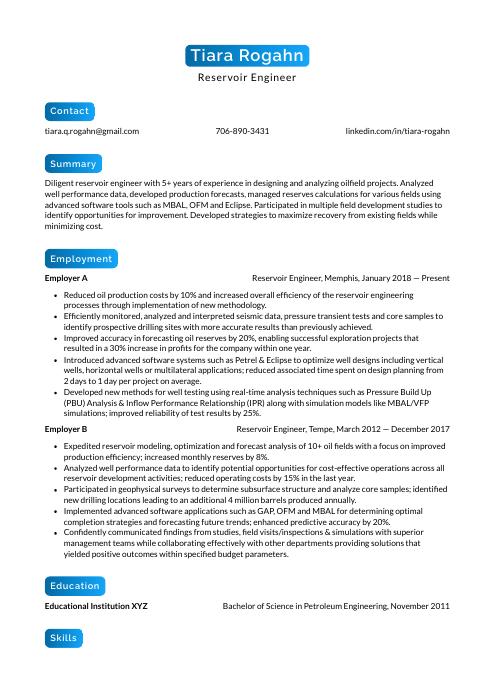 Kinkajou
Kinkajou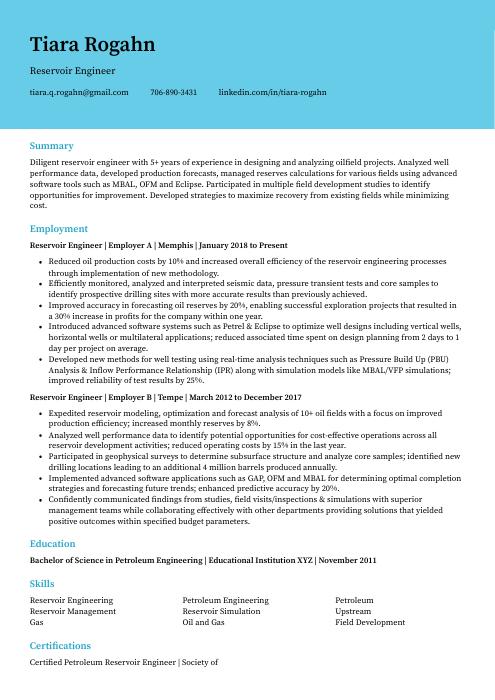 Dugong
Dugong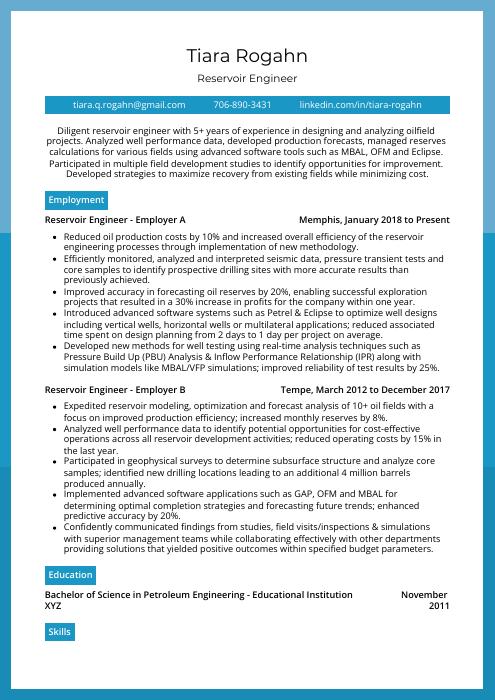 Rhea
Rhea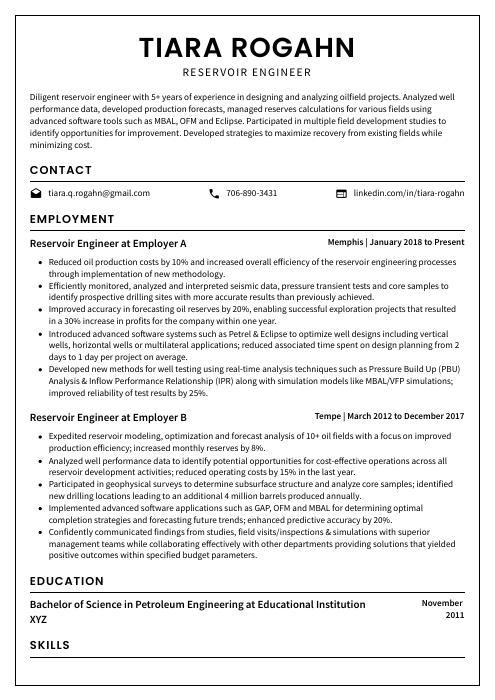 Cormorant
Cormorant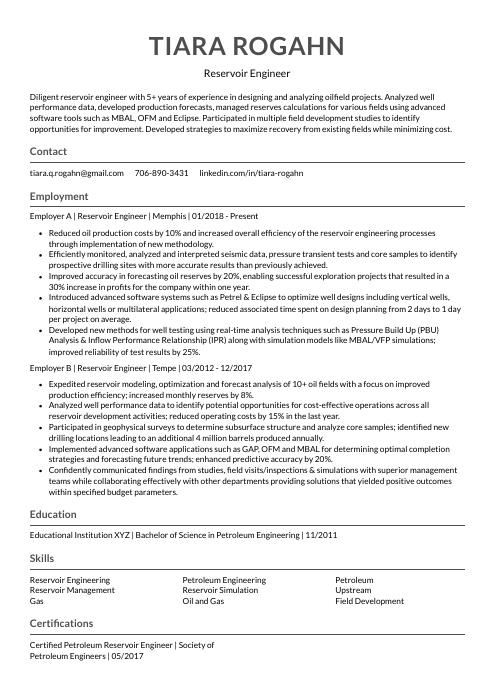 Indri
Indri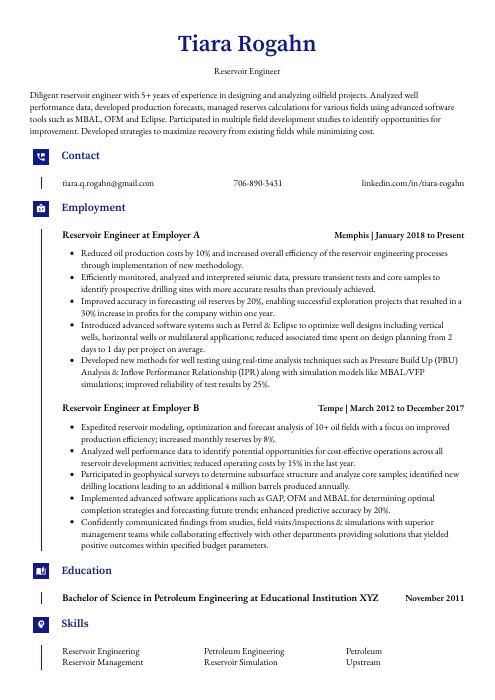 Gharial
Gharial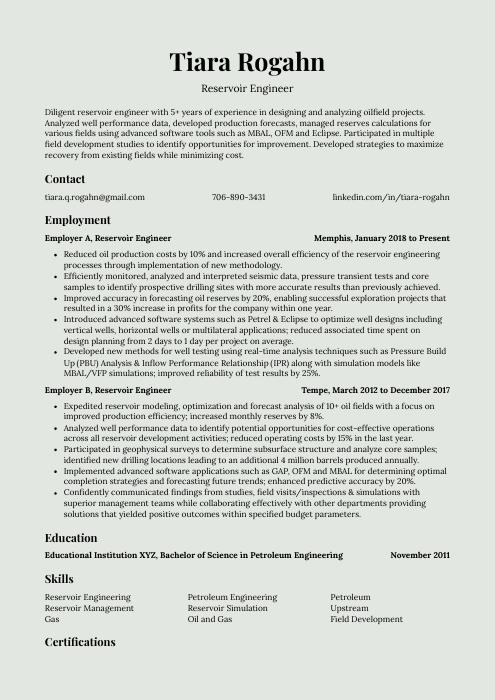 Saola
Saola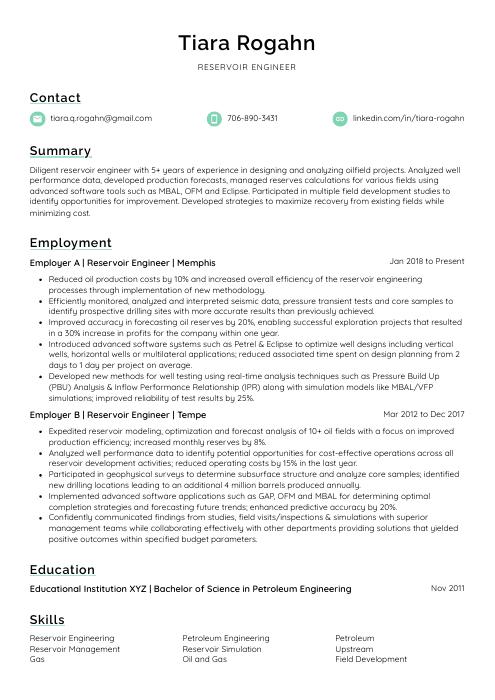 Lorikeet
Lorikeet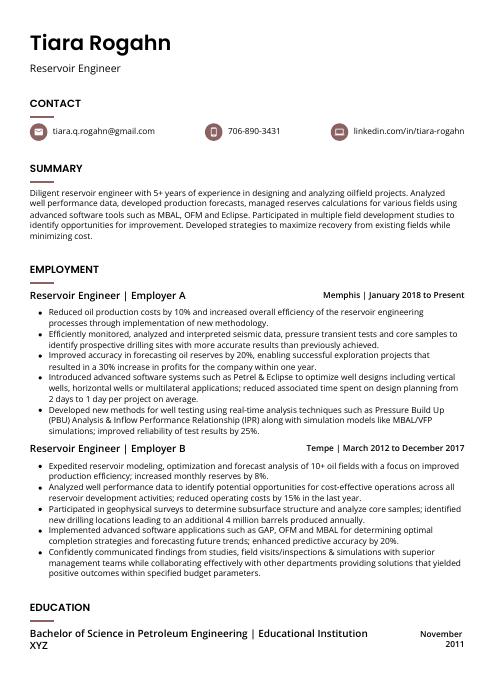 Fossa
Fossa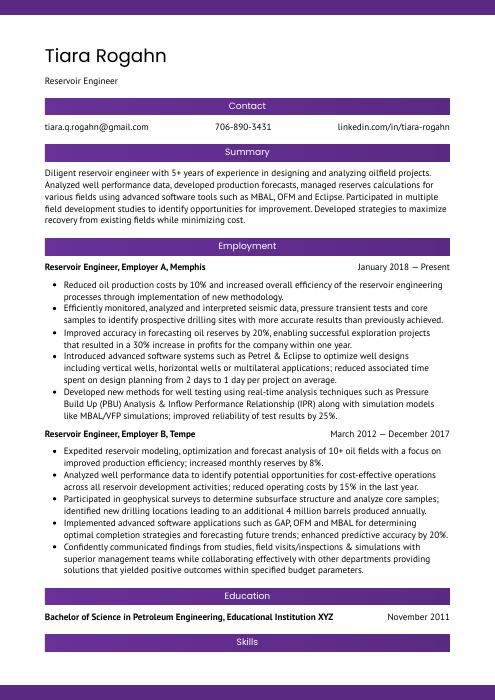 Jerboa
Jerboa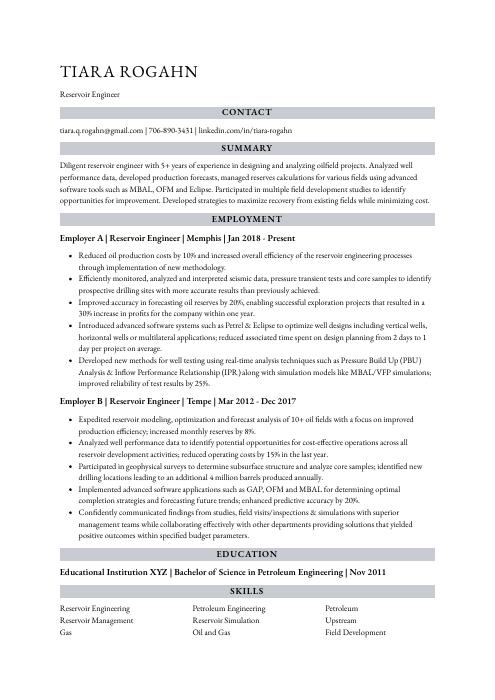 Numbat
Numbat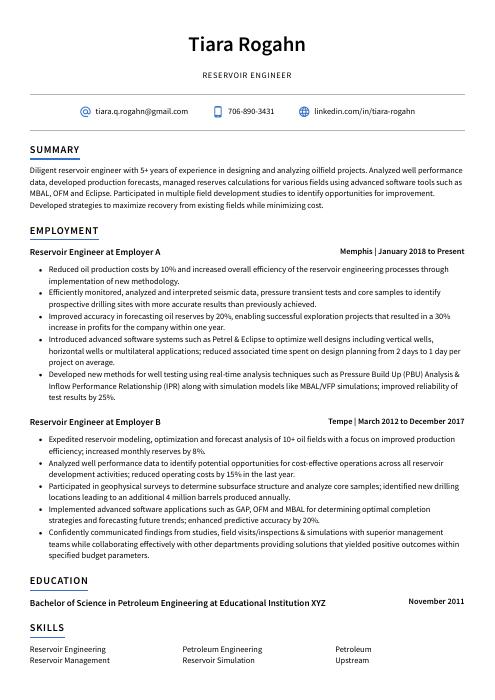 Axolotl
Axolotl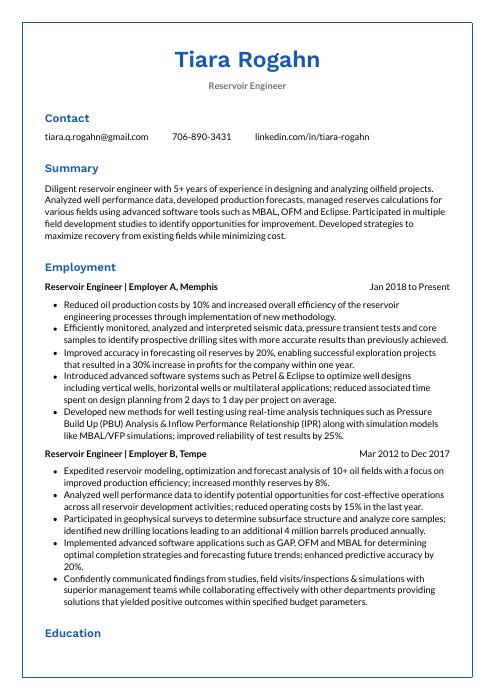 Markhor
Markhor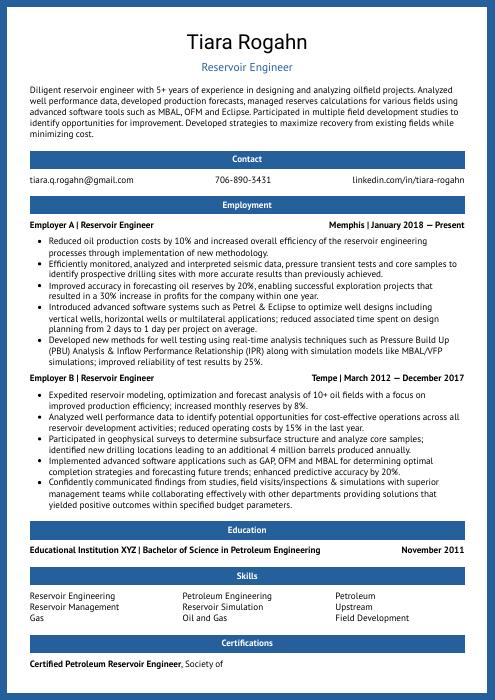 Ocelot
Ocelot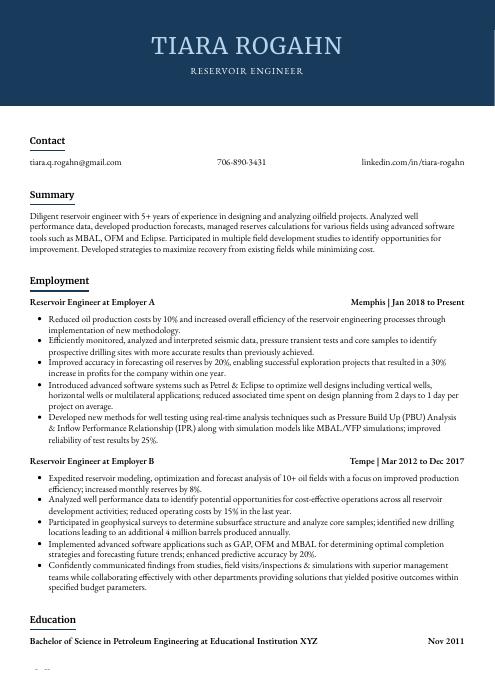 Bonobo
Bonobo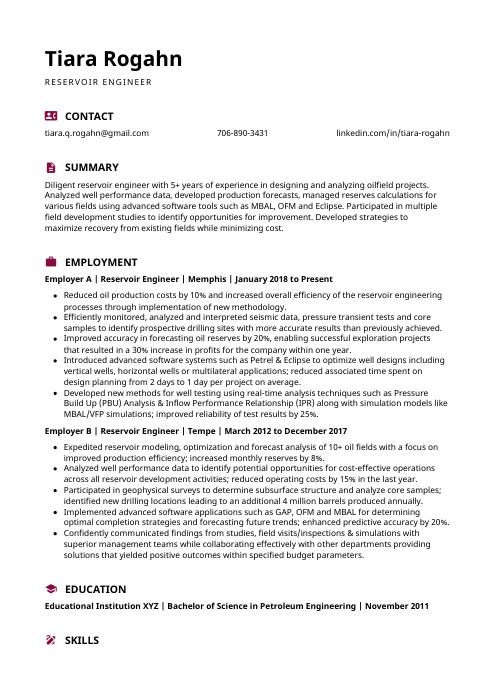 Hoopoe
Hoopoe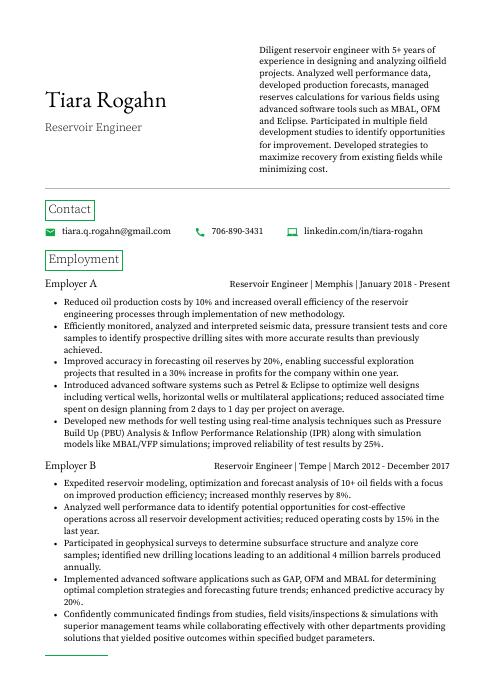 Quokka
Quokka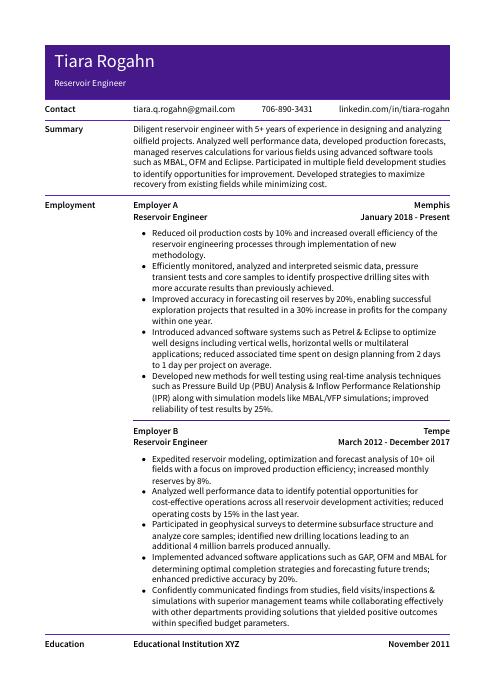 Pika
Pika Rezjumei
Rezjumei
